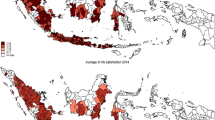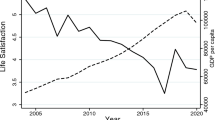Abstract
Happiness may be one of the most important goals that many people pursue in the world. This study adopts a qualitative approach to investigate the determinants of happiness for Taiwanese/Chinese people. Further, we investigate related service opportunities for happiness via a field survey of 808 respondents. This study identifies four happiness segments for people in Taiwan/China: Influential & Outgoing, Adequately Settled, Pleasure Seeking, and Young & Restless. These four happiness segments differ markedly in terms of characteristics and potential service opportunities. The findings of this study have implications for researchers who are seeking to understand happiness in an Asian country.


Similar content being viewed by others
References
Ali, A. J., Lee, M., Hsieh, Y.-C., & Krishnan, K. (2005). Individualism and Collectivism in Taiwan. Cross Cultural Management, 12(4), 3–16.
Borooah, V. K. (2006). What makes people happy? Some evidence from Northern Ireland. Journal of Happiness Studies, 7(4), 427–465.
Brulde, B. (2007). Happiness theories of the good life. Journal of Happiness Studies, 8(1), 15–49.
Cancian, F. M., & Oliker, S. J. (2000). Caring and Gender. Thousand Oaks, CA: Pine Forge.
Chekola, M. (2007). Happiness, rationality, autonomy and the good life. Journal of Happiness Studies, 8(1), 51–78.
Diener, E., & Diener, M. (1995). Cross-cultural correlates of life satisfaction and self-esteem. Journal of Personality and Social Psychology, 68(4), 653–663.
Diener, E., Suh, E. M., Lucas, R. E., & Smith, H. L. (1999). Subjective wellbeing: Three decades of progress. Psychological Bulletin, 125, 276–302.
Dolan, P., Peasgood, T., & White, M. (2008). Do we really know what makes us happy? A review of the economic literature on the factors associated with subjective well-being. Journal of Economic Psychology, 29(1), 94–122.
England, P. (2005). Emerging theories of care work. Annual Review of Sociology, 31(1), 381–399.
Flint, D. J., & Woodruff, R. B. (2001). The initiators of changes in customers’ desired value. Industrial Marketing Management, 30(4), 321–337.
Ganesh, J., Arnold, M. J., & Reynolds, K. E. (2000). Understanding the customer base of service providers: An examination of the differences between switchers and stayers. Journal of Marketing, 64(3), 65–87.
Garelli, S. (2010). IMD World Competitiveness Yearbook 2010, Press Release. Lausanne, Switzerland: the World Competitiveness Center.
Gilliland, D. I. (2003). Toward a business-to-business channel incentives classification scheme. Industrial Marketing Management, 32(1), 55–67.
Glaser, B. G., & Strauss, A. L. (1967). The discovery of grounded theory. Chicago, IL: Aldine.
Graham, C. (2008). Happiness and health: Lessons-and questions-for public policy. Health Affairs, 27(1), 72–87.
Graham, C., & Pettinato, S. (2001). Happiness, markets, and democracy: Latin America in comparative perspective, Journal of Happiness Studies, 2(3), 237–268.
Griffin, J. (2007). What do happiness studies study? Journal of Happiness Studies, 8(1), 139–148.
Helliwell, J. F. (2003). How’s life? Combining individual and national variables to explain subjective well-being. Economic Modeling, 20(2), 331–360.
Hofstede, G. (1980). Culture’s consequences: International differences in work-related values. Beverly Hills, CA: Sage.
Kulkarni, S. P. (2000). Environmental ethics and information asymmetry among organizational stakeholders. Journal of Business Ethics, 27(3), 215–228.
Kwan, V. S. Y., Bond, M. H., & Singelis, T. M. (1997). Pancultural explanations for life satisfaction: Adding relationship harmony to self-esteem. Journal of Personality and Social Psychology, 73(5), 1038–1051.
Layard, R. (2005). Happiness: Lessons from a new science. London: Penguin Group.
Lelkes, O. (2006). Knowing what is good for you: Empirical analysis of personal preferences and the “Objective Good”. The Journal of Socio-Economics, 35(2), 285–307.
Lu, L., & Gilmour, R. (2004). Culture and conceptions of happiness: Individual oriented and social oriented SWB. Journal of Happiness Studies, 5, 269–291.
Lyubomirsky, S. (2001). Why are some people happier than others? The role of cognitive and motivational processes in well-being. American Psychologist, 56(3), 239–249.
Oliver, R. L. (1981). Measurement and evaluation of satisfaction process in retail settings. Journal of Retailing, 57(3), 25–48.
Parasuraman, A., Zeithaml, V. A., & Berry, L. L. (1985). A conceptual model of service quality and its implications for future research. Journal of Marketing, 49(3), 41–50.
Parasuraman, A., Zeithaml, V. A., & Berry, L. L. (1988). SERVQUAL: A multiple-item scale for measuring consumer perceptions of service quality. Journal of Retailing, 64(1), 12–40.
Ryff, C. D. (1989). Happiness is everything, or is it? Explorations on the meaning of psychological well-being. Journal of Personality and Social Psychology, 57(6), 1969–1981.
Seligman, M. E. P. (2002). Authentic happiness. New York: Free Press.
Singh, J. (1990). A typology of consumer dissatisfaction response styles. Journal of Retailing, 66(1), 57–99.
Strauss, A. L., & Corbin, J. M. (1990). Basic of qualitative research: Grounded theory procedures and techniques. Newbury Park, CA: Sage.
The Business Times (2010). Singapore sweats away the hours—and productivity. Jan 31, 2010. http://www.asiaone.com/Business/News/My+Money/Story/A1Story20100129-195280.html.
Tkach, C., & Lyubomirsky, S. (2006). How do people pursue happiness? Relating personality, happiness-increasing strategies, and well-being. Journal of Happiness Studies, 7(2), 183–225.
Veenhoven, R. (2001). Quality-of-life and happiness: Not quite the same. In G. DeGirolamo, et al. (Eds.), Salute e qualità dell vida (pp. 67–95). Torino, Italia: Centro Scientifico Editore.
Wallis, C. (2005). The new science of happiness. Time, 165(3), A2–A9.
Weathers, D., Sharma, S., & Wood, S. L. (2007). Effects of online communication practices on consumer perceptions of performance uncertainty for search and experience goods. Journal of Retailing, 83(4), 393–401.
Welsch, H. (2006). Environment and happiness: Valuation of air pollution using life satisfaction data. Ecological Economics, 58(4), 801–813.
Williams, J. D., Han, S.-L., & Qualls, W. J. (1998). A conceptual model and study of cross-cultural business relationships. Journal of Business Research, 42(2), 135–143.
Author information
Authors and Affiliations
Corresponding author
Rights and permissions
About this article
Cite this article
Chiu, HC., Hsieh, YC., Yeh, HJ. et al. The Connection Between Happiness and Service Businesses: A Preliminary Study. J Happiness Stud 12, 841–860 (2011). https://doi.org/10.1007/s10902-010-9230-x
Published:
Issue Date:
DOI: https://doi.org/10.1007/s10902-010-9230-x




